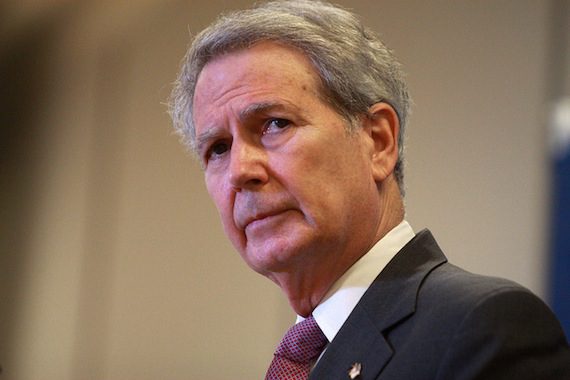Walter Jones’s War

In a Capitol filled with bloviating self-promoters, Walter Jones is a soft-spoken Southern gentleman. But even though he has all the quiet charm of a sleepy country town, the ten-term North Carolina Republican is quite capable of righteous indignation.
“Congress will not hold anyone to blame,” Jones, now 70, said of America’s Middle Eastern wars while speaking to Young American for Liberty in Raleigh last February. “Lyndon Johnson’s probably rotting in hell right now because of the Vietnam War, and he probably needs to move over for Dick Cheney.”
Since he was first elected as part of the “Republican Revolution” in 1994, Jones—whose father Walter Sr. was a congressman before him—has been one of the most conservative members of Congress. He is staunchly pro-life. He worries about the military circumscribing chaplains’ right to pray in Jesus’ name.
Not mincing any words, Jones calls Obamacare a “disaster,” which he has repeatedly voted to defund and repeal. He even opposed big government when it was offered up by Republican presidents, voting against the Medicare prescription-drug benefit and No Child Left Behind. He has scored a perfect 100 percent rating from the American Conservative Union four times, missing it twice more by just one vote.
But Jones might be best known for his strong turn against the foreign policy of George W. Bush. Representing a military-heavy district that includes the U.S. Marine Corps’ Camp Lejeune, Jones voted for the wars in Afghanistan and Iraq. When France opposed the Iraq War, he led the crusade to rename french fries “freedom fries” on congressional menus in protest.
It didn’t take long for Jones to regret the decision. Privately, he entertained doubts about the Bush administration’s claims that Saddam had stockpiles of weapons of mass destruction in Iraq capable of threatening the United States. After he attended the funeral of a Marine killed in action who left behind a two-year-old son and newborn twins, his conscience began to weigh on him.
Jones’s daughter gave him a tape of James Bamford’s A Pretext for War, which he listened to on his drives between Washington, D.C. and Farmville, North Carolina. He began speaking to other Republican skeptics of the war, including then Sen. Chuck Hagel of Nebraska, who has since become Secretary of Defense under President Obama.
The congressman’s first act of penance was to begin a letter-writing campaign to the families of military personnel killed in Iraq, a practice that continues to this day. “My heart aches as I write this letter as I realize you are suffering a great loss,” reads one. “I know that these words are inadequate in trying to express my deep sympathy to you and your family at the death of your loved one.”
“He had so deep a love for his country that he was willing to give his life,” Jones continued. “In John 15:13, Jesus said, ‘Greater love have no man than this, that he lay down his life for his friends.’”
Jones’s next act of penance was to work on bipartisan legislation aimed at ending the war. He and Hawaii Democratic Rep. Neil Abercrombie, who is now the Aloha State’s governor, introduced the Homeward Bound resolution, imposing a timetable for withdrawal from Iraq.
Even after the Iraq War finally wound down, Jones remained a voice for peace. He has been a leading Republican advocate for ending the 12-year-old war in Afghanistan. “Kids are still dying,” he says. He notes the escalating death toll and price tag, expressing concern that troops will remain stationed in the country after the promised 2014 deadline. In November, he sent a letter to the president opposing a proposed bilateral security agreement with Kabul that would keep the war going.
“This agreement will obligate billions of American tax dollars and expose American troops to further danger overseas—all while meeting [Afghan] President Karzai’s ever-growing list of demands,” Jones wrote. “After 12 years, billions of dollars, and President Karzai’s continued disrespect for the United States, many in the House and Senate believe it is time to end our commitment in Afghanistan.”
Jones was one of ten members of Congress to sue President Obama in attempt to stop the unauthorized war in Libya. He called the bombing an “abuse of power.” “Libya had done nothing to America,” Jones said at the time. I realize they’ve got an evil leader, Qaddafi, but still, you don’t go around the world attacking countries because they have an evil leader.”
In September, Jones took the same position concerning a proposed bombing campaign against Syria. “I will vote against any proposal to authorize U.S. military intervention in Syria,” he said in a statement. “The reality of America’s dismal fiscal situation is that any money spent to bomb Syria will be borrowed from overseas or will be taken from the Defense Department’s already-shrinking budget—resulting in even fewer resources for Eastern North Carolina military installations. Neither of these options is acceptable.”
If Obama had bypassed Congress and intervened in Syria anyway, as he did in Libya, and a single service member had died, Jones tells me, “I would have filed several articles of impeachment against the president.” That time, Jones’s views carried the day with members of Congress in both parties and there was no war.
Many assumed Jones’s antiwar turn would end his political career. Local Republican leaders grumbled about his “disloyalty.” The restaurant in his district that helped put freedom fries on the map took down the congressman’s pictures. Party bosses in Washington first denied him the top Republican slot on a House Armed Services subcommittee and then kicked him off the House Financial Services Committee. He has attracted primary challengers, the strongest coming from Joe McLaughlin, an area country commissioner.
But Jones has persevered. He beat McLaughlin by nearly 20 points, winning all but three counties in his district. In 2012, he beat former New Bern Police Chief Frank Palombo by almost 38 points. Both focused heavily on Jones’s foreign policy stands and resulting alliances with liberal Democrats to paint him as a left-winger. Former Bush aide Taylor Griffin has moved back to North Carolina to try next year.
“I didn’t come up here to be a puppet for anyone,” Jones told the Washington Times. “And I think the public back in my district, which is the most important, has seen I’m willing to do what I think is right.” So far, his district has rewarded him for his independent streak rather than empowering the self-appointed guardians of party discipline.
Not coincidentally, Jones was one of the few members of Congress to endorse Ron Paul for president during the GOP primaries. Paul’s vote total swelled from over one million in 2008 to more than two million in 2012. Bush’s foreign policy is no longer the only one associated with conservatism or the Republican brand.
“I continue to be disappointed with the Republican leadership,” Jones says, but he acknowledges that more members of his party are beginning to question the bipartisan interventionist consensus. “I’m encouraged by the younger conservatives and libertarians.” Jones points to the lopsided vote for the amendment he and Massachusetts Democratic Rep. Jim McGovern attached to the National Defense Authorization Act requiring complete redeployment from Afghanistan by June 2014.
Democrats overwhelmingly supported the amendment, by a vote of 185 to 9. But a majority of Republicans voted for it too, by a margin of 120 to 112. This included longtime hawks like James Sensenbrenner and Buck McKeon. “I was very happy with the new Republicans who voted for it,” Jones says, including newcomers like Justin Amash, Kerry Bentovolio, and Thomas Massie, as well as the recently returned Mark Sanford.
Walter Jones’s past is especially interesting in light of the present, with many members of Congress seeming poised to repeat the mistakes of 2002-03. Even many Democrats have signed on to legislation that could undermine negotiations with Iran over its nuclear program, including Senate Foreign Relations Committee Chairman Robert Menendez and powerful New York Senator (and Iraq authorization of force supporter) Chuck Schumer. The most likely alternative to diplomacy is military action.
Jones has been pushing legislation demanding congressional authorization for any military action against Iran since 2007. Last year, he was one of just six House members voting against a saber-rattling resolution on Iran. Jones and Minnesota Democratic Rep. Keith Ellison also coauthored a letter to the president—later signed by nearly 40 members of Congress from both parties—urging real diplomatic engagement with Tehran.
“We hold no illusions about the abuses of the Iranian regime and are well aware that it rejected your previous diplomatic overtures,” they wrote. “At the same time, we agree with most Americans that the United States should not enter a new war, just as we are finally ending two others.” Jones and Ellison warned a “military strike against Iran could lead to a regional war in the Middle East and attacks against U.S. interests.”
Worst of all, the lawmakers conclude, preventive war might lead to the very result the United States and its allies in the region most hope to avoid—an Iranian government armed with nuclear weapons. “There is a limited amount that we can accomplish overseas,” Jones says. “I guess that’s the Ron Paul in me.”
Pace the congressman’s Republican critics, this doesn’t make Jones a pacifist or isolationist. He continues to support a strong national defense. He backed a military response to the 9/11 terrorist attacks. He even acknowledges that negotiations with Iran aren’t guaranteed to succeed and can’t go on forever.
But Jones does believe that the authentically conservative position is to count the cost of war—human and fiscal—as much the dollars and cents that go into any other government program. Indeed, it is the pro-life, pro-limited government thing to do. “The [Republican] party needs to understand that we are the defenders of the Constitution,” he says. To Jones, that means more than just saying no to social programs.
This has caused Jones to speak out on civil liberties and extrajudicial killings, especially via the profligate use of drones. “When that drone comes to America from a foreign country, we’re going to wonder what in the hell hit us,” he said at the same conference where he raised eyebrows about Cheney. “It was a drone.”
The Cheney comment, however, is another area where people misunderstand Jones. He is not simply judging the former vice president. “Christ is a man of humility,” Jones once told Mother Jones. “Washington is a city of arrogance.” (Jones, a convert to Catholicism, gave the interview because his young communications director mistakenly believed Mother Jones was a Catholic magazine.) 
Jones is driven by his own personal feeling of guilt, his remorse for supporting the same war Cheney did, and his desire to make amends—to put things right with God and, to whatever limited extent he can, the men and women he now believes he wrongly put into harm’s way. He knows in his heart that he too will be judged.
All Jones can do is vote his conscience—and do his part to help future Walter Joneses see the light next time, before it’s too late.
W. James Antle III is editor of the Daily Caller News Foundation and author of Devouring Freedom: Can Big Government Ever Be Stopped?
Comments